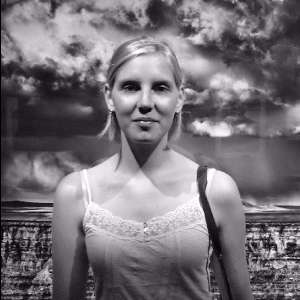When one of the most sought-after sopranos of our time slips into the role of her most famous countrywoman, the foundations for an eventful evening of opera have already been laid. The Swedish world première Notorious, after Alfred Hitchcock's film of the same title, shows in an all-round successful production that contemporary opera can have a promising future.
"Notorious is a story about love, how it blinds us, yet is also the very elixir that makes life worth living." Those who've seen the film with Ingrid Bergman and Cary Grant know that its plot around espionage, crimes of war and torn love offers more than enough drama for an opera. Kerstin Perski's libretto sticks to the film in as far as it provides a few charming déja-vu moments, but also gains enough liberty to transform the story and make it suitable for an opera production. This is achieved especially in the introduction of protagonist monologues which clarify their motives and actions to the audience. The music, which was created based on the text and in symbiotic collaboration with Perski, appears to wrap snugly around each word. Every character has their own, distinctive tone, reveals a particular mood. The long phase of creation, in which at times singers had been booked before the music was written, allowed Hans Gefors to tailor the parts to the individual voices. "For a composer like myself the decisive aspect of drama is that every participant sings as if to convince: see the world through my eyes!" Those present at this première know: all singers have convinced indeed.
As was to be expected, Nina Stemme was the star of the evening and filled the hall with her full-bodied soprano. In fierce accusations against her corrupt father she gave the power of her rich lower register full scope and projected the image of a confident, passionate Alicia Hauser. But it wasn't only the stronger side that suited her; every change and shift in plot was always audible in her voice. When she arrived in Rio, believing in a new start with her beloved Devlin, she gave her voice an entirely new, lyrical quality, presented a soft sound that hadn't lost any of its initial strength. As those who've seen the film know, however, her happiness is short-lived, and the dramatic tone soon returned to her singing. Her vibrato, sparsely used previously, now gained vigour by deliberate use, and the rapid changes from legato to staccato also emphasised her being emotionally torn.
As spy and lover Devlin, we saw the Swedish baritone John Lundgren. His voice conveyed unquestionable authority and a will of steel. Like Stemme's, his singing went smoothly hand in hand with his acting, making the action even more graspable. He illustrated the various facets of his character by alternating a tight, defiant and an infatuated, sighing quality. His desperate call for his beloved in falsetto voice also showed the fragile side of his role.
Other soloists were Michael Weinius and Katarina Karnéus. The mezzo gave her melodies a pervasive force that tended towards the exalted in the brief interjections of her role as distrustful mother-in-law. As her son Alex we heard the Swedish singer Michael Weinius, who had made his transition from baritone to tenor in 2004. The caressing nature of his voice was rarely interrupted with a forceful outcry (directed mostly at his wife Alicia). One of the most beautiful scenes of the evening, the Act IV trio of Alex, Alicia and Devlin, was entirely dominated by the soft colours of the tenor: all three were illuminated with individual spots, nothing else but the three singers are visible on stage. They all sang of love belied, love unfulfilled, love yearning. Their delicate phrasing and finely attuned voices made them sing as one, quietly accompanied only by the strings. Here, words weren't merely sung, here they had truly turned into music.
Gefors has included further cunning ideas in his score: he demands dramatically loud choral scenes, for example, or imbues them with hissing noises, giving the opera its titular "notorious" character. He also has a South American flair shine through repeatedly in the percussion parts, while short violin motifs remind the listener of the mew of a seagull. Neither singers nor instrumentalists gave the impression of performing a brand new work; they all shone at their best, led by Patrik Ringborg.
The entire scenery is embedded in Keith Warner's clever staging that skilfully combines the familiar with the new. The set design often toys with projections of black and white images that draw parallels to the 1946 film. Even the costumes are partly kept in the vein of the cinematic classic, whereas new ideas meet the dramatic demands of opera elsewhere.
Only a short look at the extensive programme notes showed the production's many layers; I think the concept of exciting, modern opera proved to be utterly successful.
Translated from German by Hedy Muehleck.




